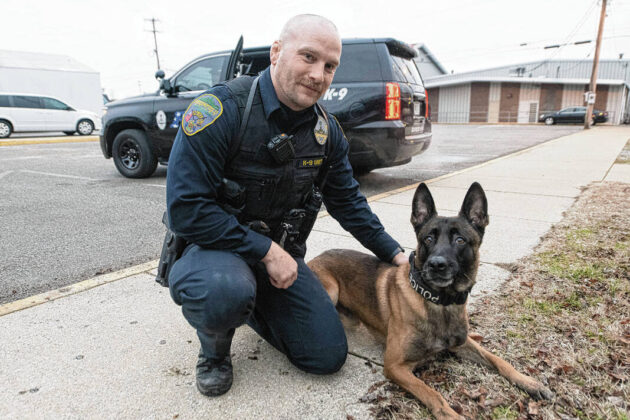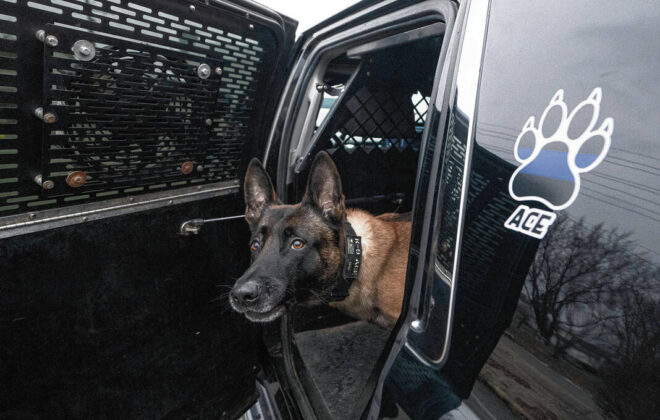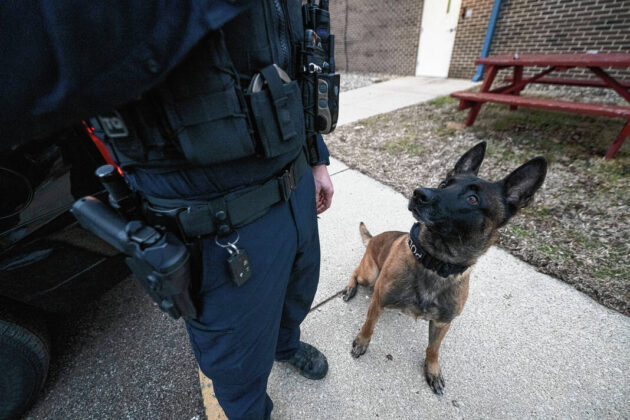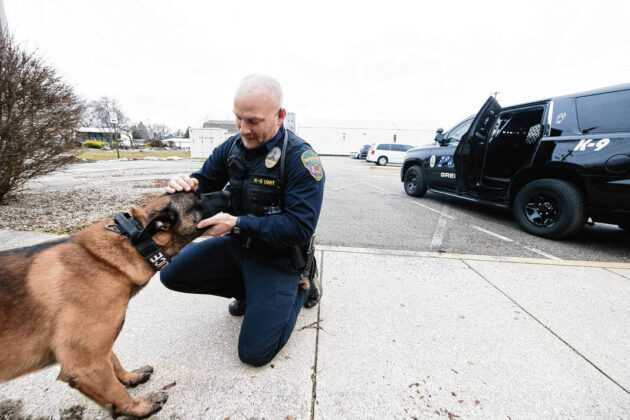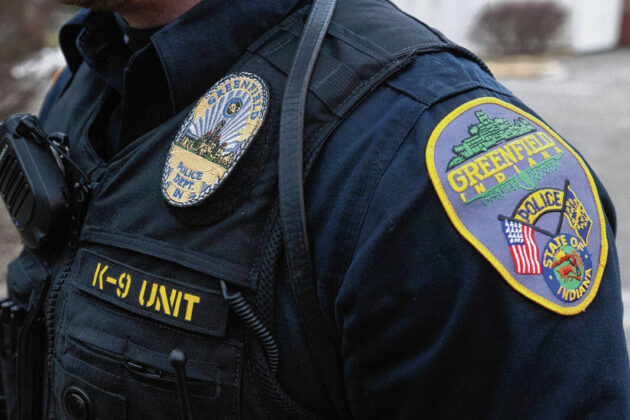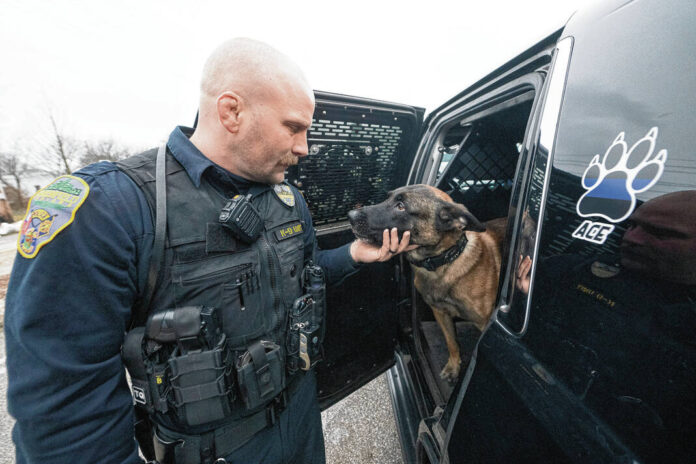
Pictured: Greenfield Police Officer Caleb Freeman along with his dog ACE, a Belgian Malinois. The pair were getting ready for their shift on Sunday, Jan. 23, 2023. Indiana Rep. Chris Jeter, whose district includes part of Hancock County, has a bill making its way through the Indiana General Assembly that would strengthen penalties for those who harm law enforcement K-9s.
Tom Russo | Daily Reporter
HANCOCK COUNTY – Patrolman Caleb Freeman has plenty of gear on his belt and vest.
“I’ve got a Taser, I’ve got a department-issued handgun, I’ve got a baton, I’ve got all these tools,” the Greenfield Police officer said.
But perhaps one of the most effective ones is at the end of a leash – Ace, the 6-year-old Belgian Malinois Freeman considers more than just a tool, but a partner and even family.
A state legislator who represents part of Hancock County has authored a bill that aims to look out for Ace and other K-9s by putting more teeth into a law regarding penalties for killing police dogs.

House Bill 1306, authored by Indiana Rep. Chris Jeter, R-Fishers, an attorney whose district includes part of northwestern Hancock County, would increase the penalty for killing a police K-9 from a Level 6 to a Level 5 felony, carrying a sentence of between one to six years in prison and a fine of up to $10,000. Killing a K-9 in the commission of a crime would also be an aggravating circumstance for sentencing in criminal cases.
“These K-9s are vital for police officers who work tirelessly to protect our community,” Jeter said in a news release. “Not only do they serve alongside their handlers, but they also fearlessly pursue suspects and take on dangerous tasks to save Hoosiers.”
The Indiana House of Representatives has passed the bill and referred it to the state Senate.
Jeter’s legislation is inspired by the 2019 killing of Harlej, a K-9 with the Fishers Police Department shot by a fleeing suspect. With the current maximum sentence for the crime standing at six months, Jeter said the penalty is too low and criminals who take the lives of police K-9s like Harlej need to face stiffer penalties. Fishers Police Officer Jarred Koopman, who was Harlej’s handler, testified in support of the legislation.
In addition to the emotional toll of losing a K-9, Jeter said, their deaths are costly and impact budgets as training can cost up to $45,000 per dog.
The morning after Harlej was killed, Freeman and some of his colleagues went to Fishers to assist with the search for the weapon used, although it was found before they arrived.
“With how close Fishers is to us, it really hits home,” Freeman said.
Freeman has been working with Ace for about four years. The dog is trained in drug detection, and can locate substances like methamphetamine, cocaine, marijuana, ecstasy, heroin and fentanyl.
He is also trained in patrol work, including tasks like building searches, tracking and apprehension.
“He assists all of us and the citizens of Greenfield in proactively trying to get narcotics off of the street through his narcotic detection, and also using his patrol work skills assisting us in getting violent criminals off the street,” Freeman said.
Freeman described Ace as a partner to him and his colleagues.
“When I am able to use him in that aspect of his skills, it puts us in a much safer position when we’re doing our job, because there are some things we can obviously do ourselves. But if I know somebody’s wanted – whatever the crime that they may be wanted for – is hiding in a house, or hiding in a room, we could just go in there and try to capture them. But depending on the level of offense and the severity of the crime, Ace can do the same thing while keeping us in a safer position. He helps keep us safer, which helps us go home at night or in the morning to our families.”
Danger to Ace is on Freeman’s mind as they go about their work.
“That’s something that we try to implement in a lot of our training as well,” he said, adding Ace wears body armor with some bullet resistance and that’s stab-proof.
While Ace has encountered some risks during apprehensions, attempts by those he’s apprehending have never been lethal, but rather what Freeman described as natural reactions.
“Most people … their hands go to the dog because they’re trying to stop what’s happening, and that’s not to say they’re trying to choke him or really punch him,” Freeman said. “I’ve had people try to punch him … and I had one guy that tried to bite him. That was a really silly decision.”
Freeman welcomes Jeter’s bill.
“My knee-jerk reaction to that news was – it’s about time,” he said. “…These dogs are like family. They’re here to do a job, they’re trying to do the best they can, and I think that being able to hold future potential offenders accountable for those treacherous acts – like doing something as terrible as trying to, or effectively killing a law enforcement animal that’s purely just doing what it’s trained to do – and attempting to hold them accountable for the crimes that they’ve committed, I think that it’s a really, really good thing.”

